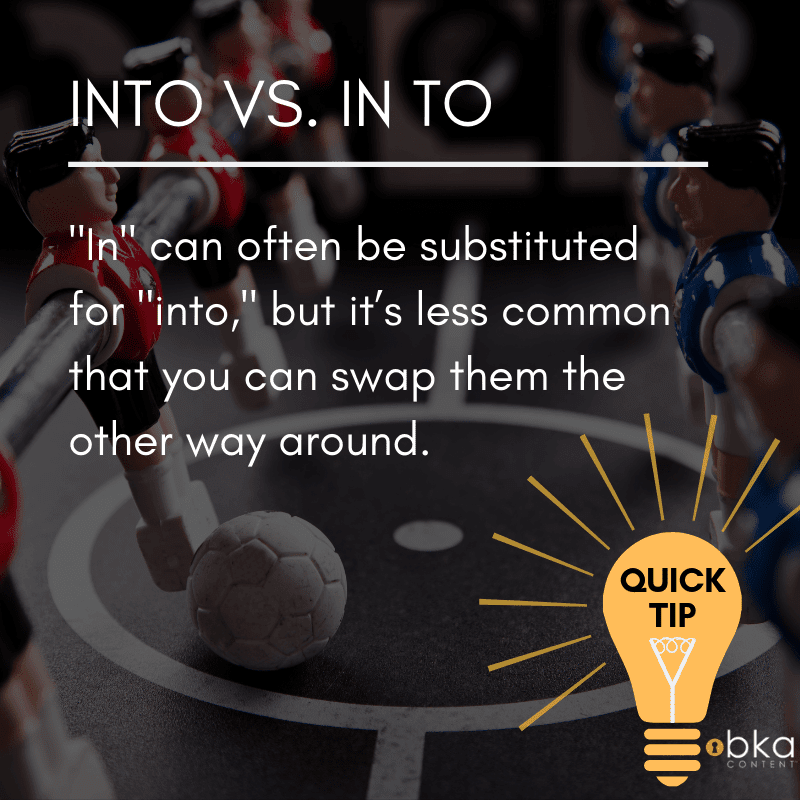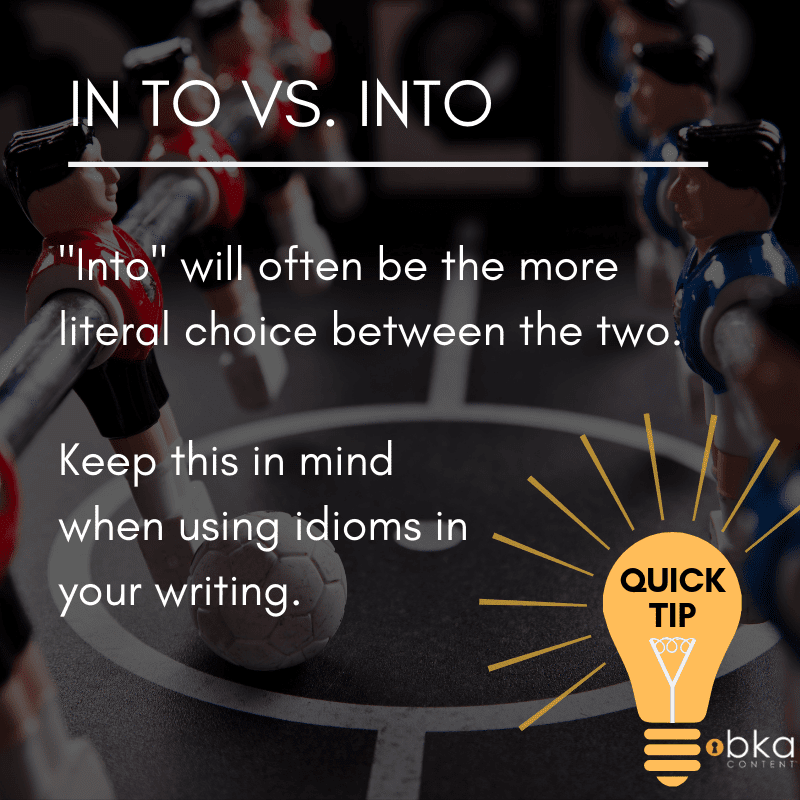
Commonly Confused Words: Into vs. In To

A team of two little guys against one big fella — who will win? Into vs. in to is a classic grammar cage match, though the winner depends on the situation, of course. Let’s talk about how you can start telling between these two commonly confused words.
Deciding Between Into vs. In To – With Examples
So what’s the difference between into and in to?
Use into when you want to say that the modified and modifier are moving or otherwise tending toward, through or against each other, physically or conceptually. Use in to for every other scenario.

Into vs. In To Examples
It all comes down to parts of speech. Into is always a preposition. In to is frequently made up of parts of verb phrases. Sometimes in is the end of a phrasal verb. Similarly, to is often the beginning of an infinitive form of a verb. Here are some into vs. in to examples:
- I just checked in to see how everybody was doing. (Phrasal verb and infinitive verb)
- He flew in to Dulles Airport. (Phrasal verb and preposition)
- She poked her finger in to test the pie. (Preposition and infinitive verb)
Using the In To vs. Into Cheat Sheet
It’s still easy to make mistakes when using into or in to, especially when spellcheck doesn’t know the difference between log in to vs. log into. To help, here’s a table of some common phrasal verbs with usage examples. Keep in mind that they might not apply if you mean the base form — break, check, log, and so on — literally, or if the word isn’t a verb. For example, you would roll a log into a river, but you would log in to an account.
|
Break in (to a diamond shop) |
Fly into (a frenzy) |
Log in (to Myspace) |
|
Break into (song) |
Get in (to a club) |
Look into (a mystery) |
|
Bump into (someone) |
Get into (stamp collecting) |
Move in (to a bigger house) |
|
Call in (to work) |
Give in (to temptation) |
Plug in (to charge) |
|
Check in (to the airport) |
Go in (to work) |
Plug into (the wall) |
|
Check into (a mystery) |
Go into (the office building) |
Run into (an old friend) |
|
Come in (to a diamond shop) |
Hand in (to the teacher) |
Sign in (to the library) |
|
Come into (an inheritance) |
Head in (to the cave) |
Talk into (coming along) |
|
Drop in (to visit) |
Let in (to the secure area) |
Turn in (to the authorities) |
|
Fly in (to New York) |
Lock in (to a closet) |
Turn into (a werewolf) |
Into vs. In To: Meanings Matter
When studying into vs. in to, there’s plenty of room for confusion at first. That’s because correctness depends on the underlying meaning. Usually, everything becomes clear once you focus on what you’re trying to say. Take this simple homophonic sentence:
- That leather broke into some soft pieces.
- That leather broke in to some soft pieces.
They’re both very different. The first one conveys a sense of leather that falls apart. The second one means that the material became supple and flexible once the pieces were conditioned with time, care and wear. As you can see, into and in to convey unique meanings when inserted into the same sentence.
Using In To Replace Into
In can often be substituted for into, but it’s less common that you can swap them the other way around. In is more general, typically speaking.

Different people tend towards into or in to, and focusing on this detail can be a good way to capture how individuals talk. That’s useful in professional writing, especially if you’re attempting to gain credibility with a specific market or convey a different tone, for example.
That begs the question: If in can often stand in for into, why does English have both words? Why is into a word? The biggest reason: Into is more specific, so using it can help avoid confusion in many cases.
When To Use In or Into
In wears a lot of hats, as does to, but into is strictly a preposition. That said, into is still versatile. Knowing how to use it correctly will help you make the best decisions for your writing. Here are some examples of into vs. in:
Into Something
The first definition of into involves getting physically closer. The ideas of insertion, entry, inclusion and combination are some examples of its primary meaning.
- The deposits funneled into an offshore account.
- They admitted her into the group.
- Pour the egg mixture into the double boiler, then stir until smooth and thick.
Into Form
You can also use into more conceptually. It expresses conditions:
- We all had to get into better shape for the climb.
- They didn’t want to get into any trouble.
- She flew into a rage.
Into a Profession
Into also works when talking about actions, jobs or ownership. Using into can help differentiate from physical location in select cases, such as the first example below.
- After his oil-mining venture tanked, Chris had to go into another field.
- We invested heavily into credit default swaps right before the housing crash.
Into a Hobby
You could also talk about interests using into. This is a concise way of talking about what people like, so you might want to avoid it if you’re trying to make word count. On a serious note, this usage could come across as unprofessional in some settings.
- Prince Thutmose was totally into cats.
- He got into metal after his first concert.
- My family is into decorating profusely for the holidays — all of them.
Into Multiple Parts
If you’re into math, then you can use into to solve some unique linguistic problems. It’s used to express division. Alone, it introduces the dividend.
- To define integrals, you can start by dividing the area under a curve into an infinite number of rectangles.
- Dividing 10 into 30 gives you 3.
Into the Future
Into is also used to talk about proceeding or acting towards an endpoint. You can use it for many linear concepts, such as time or line of sight.
- Humoralism informed Western medicine well into the 1700s.
- We looked into the noxious abyss.
- The picnic stretched languidly on into the early summer evening.
Into a Brick Wall
To continue that idea, you can use into to express contact with something. It’s good for collisions, culminations and so forth.
- Many people come into their own professionally a few years after college.
- We ran into a cart of watermelons.
Into vs. In To: Making Intentional Decisions
Using into and in to seems simple enough until you run into a special case, such as an idiom or phrasal verb. The key is often to determine your intentions. Specifically, decide whether you want to say something literally. Into will often be the more literal choice.

Idiomatic Language Examples of In To:
The following two examples of in to both use idiomatic language to express ideas of mild enthusiasm.
- She always jumps in to discussion groups.
- Wow, that kid is really digging in to that meatloaf.
The obvious difference in these next two examples is that there’s no space between in and to. However, what started as a bit of idiomatic vim has now become literal vehemence in both cases: A person with a pattern of physically launching herself into conferences and a child excavating an entree.
- She always jumps into discussion groups.
- Wow, that kid is really digging into that meatloaf.
If you still aren’t sure whether to use into or in to — if your computer’s grammar checker has you second-guessing yourself, for example — there’s a process that generally helps: Choose in to if you can omit the prepositional phrase that begins with to and still preserve your idea’s original meaning.
- She always jumps in.
- Wow, that kid is really digging in.
Into vs. In to: Turn Hesitation Into Confidence

I hope this article helped you get into the swing of things when using these frequently confused words. Did I miss anything? Do you know of any exceptions to my rules? There’s plenty of room in the comments for us to get into it. To sign off, here are two example sentences that illustrate how to use into vs. in to by using both at the same time:
- We’re not into going in to work on weekends.
- My co-worker said, “If you’re fed up with coming in to the office daily, getting into grammar can help you go into freelance writing.”
- Commonly Confused Words: Into vs. In To - June 8, 2022
- Commonly Confused Words: En Dash vs. Em Dash - June 7, 2022
- Commonly Confused Words: Further vs. Farther - June 6, 2022

